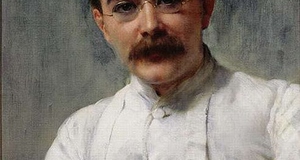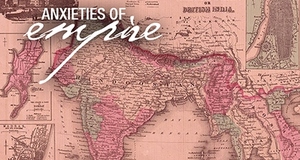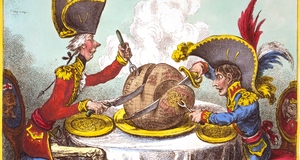Feminist and New Historicist Readings of Kipling's "The Man Who Would Be King"A New Historicist Reading“The Man Who Would Be King” is also an allegory of imperialism. Born in British India after the 1857 Mutiny, Kipling the man could not imagine an independent India. The Mutiny both altered and reinforced British stereotypes of natives and its horror of miscegenation. Kipling inherited this Anglo-Indian culture, first as a child and then as a journalist. Therefore, “The Man Who Would Be King” appears as a warning against both literal and symbolic miscegenation in order to prevent the downfall of the empire. However, Kipling the writer is rarely synonymous with Kipling the man. Many stories and poems portray a narrator who supports native uprisings, sympathizes with the Hindu practice of sati, and portrays other natives in a positive light. In the waning years of Victorian and Edwardian England, Kipling realized that the Empire was slipping away in the hearts of citizens. So the ambiguity of “The Man Who Would Be King” suggests that Kipling was not as staunch an imperialist as his contemporaries imagined. If Daniel’s “empire,” a microcosm of British India, could fall, then Kipling could foresee a day when England would no longer rule India, even if he did not look forward to it. The historical and cultural setting of late nineteenth-century British India is paramount to Kipling’s life and work. He was born in Bombay and reared there for six years (Gilmour 6). After completing his education in England, Kipling returned to India in 1882 to write for the Civil and Military Gazette; he was transferred to the Pioneer in 1887 and moved to London in 1889 (15, 70, 74). So although Kipling spent only thirteen years in India, it comprises a large part of his oeuvre; his Indian fiction and poetry spanned seventeen years, 1884-1901 (Paffard 32).As a result, the historical setting of “The Man Who Would Be King” is distinctively Anglo-Indian. This story was written in 1886 and published two years later in The Phantom Rickshaw for the Indian Railway Library (Gilmour 32; Cornell 184). Since Kipling’s audience was Anglo-Indian – civil servants, their wives, and government workers – they would have understood Peachey and Daniel’s native stereotyping and their dreams of empire. Still, Kipling praised and censured both India’s virtues and faults while he lived there (Gilmour 36). His vision of empire, with his travels to South Africa and Hong Kong, expanded after he left; he could see only its virtues (36). Since “The Man Who Would Be King” was written and published in India, Kipling could still see its faults. In 1888, he was “not yet so certain of the permanent and universal validity of ‘The Law’s’” sanctioning of imperialism, as in his later work (Fussell 230). “The Man Who Would Be King” is the story of an imperialistic endeavor gone wrong. After becoming king, Daniel wants more: “I won’t make a Nation ... I’ll make an Empire!” (Kipling 183) His imperial vision includes himself and Peachey as “Emperors of the Earth,” equal to the Viceroy and knighted by Queen Victoria, with “twelve picked English[men] ... to help us govern a bit” (183-84). Such rhetoric can be traced to fears of a Russian invasion, as seen in the Afghan wars (Keay 457). The second one (1878) was “another confused passage of play ... between the British and Russian empires in central India” (Keay 457). Although critics and historians disagree on the Russian threat, Daniel wants to train “two hundred and fifty-thousand men, ready to cut in on Russia’s right flank when she tries for India!” (Kipling 183) Imperial rhetoric was also sustained in a disavowal of native desires for independence. Throughout British Indian history, many Anglo-Indians believed that natives were neither capable of nor wanted independence, an opinion that Kipling supported in his poem “What the People Said”; a native ploughman says, “But the wheat and the cattle are all my care, / And the rest is the will of God” (Works 74).4 Believing that she “held India for the benefit of Indians,” since the area “had slumped into … decadence and degeneracy,” England supported her right to rule by insisting on India’s backwardness before the British arrived (Paffard 10; Keay 22). So the government built roads and bridges; tried to abolish caste, sati, and other practices; and made English the official language in order to modernize India (Keay 431-32). Like Daniel’s imperial vision, such a desire to govern “the dark regions of the earth” was a “reflex response among white writers” who assumed that “white men who find themselves among non-whites will naturally rise to a position of authority” (Paffard 165; Mallett 103). Kipling himself believed that “Indians needed – and would continue for a long time to need – British supervision,” so he “neither questioned British rule nor suspected its impermanence” (Gilmour x, 63). Imperial rhetoric continued in a deliberate misconception of the natives’ identity as Indians. The British insisted that, without their intervention and rule, natives would fight among themselves, e.g. Hindus versus Muslims. Peachey supports this view by insisting that, when not “fighting one against the other,” Kafir natives also fought “with the Mahommedans” (Kipling 182). Kipling himself believed that “as soon as [British supervision] disappeared, ‘the old, old racial ineptitude’ would assert itself” (Gilmour 63). Like many contemporaries, he also thought that the term “native” was ambiguous: “the Mahommedan who hates the Hindu, the Hindu who hates the Mahommedan,” or the Eurasian, “the semi-anglicized product of our Indian colleges who is hated and despised by ... Hindu and Mahommedan?” (Pinney 97-98)5 Such concepts of natives culminated in stereotypical views of their character. Peachey insists on native savagery by describing an Indian rajah who murders his widowed mother-in-law, though in a “native” fashion; he “filled her up with red pepper” before hanging her “from a beam” (Kipling 164). The narrator believes that native states, “the dark places of the earth [and] full of unimaginable cruelty,” also contain “oppression and crime”; their rulers are “drugged, drunk, or diseased” (165). He also doubts the success of Peachey and Daniel’s venture into Kafiristan,6 insisting that “the people are utter brutes, and even if you reached them you couldn’t do anything” (170). Daniel concurs, calling the natives “an all-fired lot of heathens” (170). Their opinion echoes the Anglo-Indian view that “the assimilation of Western ways is not more than skin deep” (Paffard 14). As a result, the Kafirs seem barbaric, gullible, and superstitious. They think it is not proper for “daughters of men [to] marry gods or devils”; otherwise, such “daughters” will die (Kipling 186). They also take Daniel and Peachey for kings first and then gods. When the hoax is revealed, they kill Daniel and crucify Peachey, actions that many readers consider barbaric. Kipling himself considered Indians “inferior . . . especially in running an administration”; he often complained about “men who took bribes, did not wash, maltreated their women, thought of nothing except intrigue and seduction, and possessed an ‘absolute incapacity for truth’” (Gilmour 59, 68). Why do Kipling and his characters hold such stereotypes? The answer lies in Peachey’s response to Daniel after the aborted wedding: “There’s no accounting for natives. This business is our Fifty-Seven” (Kipling 188). England’s insistence on native inferiority to white was a direct result of the 1857 Mutiny, in which thousands of sepoys – Hindu, Muslim, and Bengali soldiers of the empire – rose up against their superiors. One immediate cause was Muslim soldiers’ refusal to use gun cartridges greased with pork fat, since pigs are an anathema to Muslims (Keay 438). The Mutiny resulted in the deaths of English men, women, and children, as well as the formal handover of the East India Company to the British Crown (436-47). It also reinforced stereotypical views of natives as “backward” people who needed white men to govern them (Wurgaft 8-10). Anglo-Indians considered the Mutiny “proof that the Indians were barbaric people whom it was their heroic duty to civilise” (Paffard 2). Inherent faults of “native character included indifference to order and cleanliness, sexual depravity, and passivity” (Wurgaft 45). The British applied Darwin’s theory of natural selection to suggest the idea of “superior and inferior races” (Cavaliero 171). Since natives were considered barbaric, backward, superstitious, and unclean, Anglo-Indian society abhorred miscegenation and saw the Mutiny as a warning against it (Roy 80). Eurasians, a mix of English and native, “were thought to have” taken part in the Mutiny (Marx 62). So Anglo-Indian society focused on “distance between the races,” in marriage and in other parts of colonial life (61). Such attempts to separate British and Indian resulted in the social ostracism of Eurasians, considered a union of the worst of both races (Paffard 20). Although he saw Indians as inferior and despised their “unclean” habits and “immoral” characters, Kipling thought of Eurasians in a more positive light. In “City of the Dreadful Night” (1891), a narrative of his experiences in Calcutta, Kipling describes India’s people as “neither Hindu nor Mussulman [but] Eurasian,” a new “race” with “possibilities” (Works 744). He even “accept[ed] ... mixed marriage and ... an increased Eurasian population as an inevitable part of his political vision of a semi-independent India permanently settled by the British” (Paffard 12). However, Kipling’s stories on love affairs between English men and Indian women always end in failure; otherwise, biological and cultural distinctions between ruler and ruled would blur (McBratney par. 9). That blurring is the Eurasian child, “the greatest danger to British prestige” and “Anglo-Saxon racial purity” (pars. 9-10). As a result, no such child lives in Kipling’s stories (par. 10). He never depicts relationships between English women and Indian men either (par. 4). Therefore, although Kipling the man thought Eurasians were acceptable, the Anglo-Indian society of which he was a part did not and neither does Kipling the writer. Daniel first considers the Kafirs “heathen”; after becoming a “God,” he decides that they are English or descended from the English, since they appear as “fair men ... with yellow hair” (Kipling 177). However, the Kafirs are really native, with all their superstitions and savagery.7 Daniel’s attempt to marry one of his subjects – mixing English and Indian, ruler and ruled – is an Anglo-Indian taboo, for which he must die. If Peachey’s and Daniel’s “exploits are a replication on a small scale of … the British in India” (Gilmour 38), then Daniel’s failed wedding is a warning to Anglo-Indian society of what will happen when ruler and ruled, English and Indian, sexually unite. If such miscegenation continues, then the Empire will be destroyed from within. The narrative is also a warning against symbolic miscegenation. By wanting to take a native wife, Daniel blurs the wall of separation between English and Indian, white and native. After trying to be a god to the Kafirs, his “appropriate imperial response is to remain English” (Grella 258). Daniel tries to “admit his kinship with his subjects” instead (Mallett 103). His death is “apostasy from Englishness [and] ... ‘going native,’ always a terrible offense against the colonial code” (Grella 258). The Kafirs’ response is appropriate; by “cutting [Daniel’s] bridge and destroying him,” they understand and uphold the taboo against symbolic miscegenation (Paffard 78). However, Kipling’s enlightened views of Eurasians allow for another interpretation. He looked forward to when English and native, white and non-white, could marry without suffering social ostracism, but that time had not yet come. Daniel’s brave desire to marry a Kafir native and subject was unacceptable in British India, which was not prepared to recognize interracial marriages. So to avoid offending his Anglo-Indian readers, for whom the concept of British and Indian, ruler and ruled, first marrying and then pro-creating was frightening, Kipling let this attempted marriage fail. The only appropriate response is to abort the wedding and send Daniel to his death for violating such a taboo. By letting his “empire” fall, Kipling also foresaw the possibility of all kingdoms crumbling one day, including the British Empire.Continued on Next Page » Suggested Reading from Inquiries Journal
Inquiries Journal provides undergraduate and graduate students around the world a platform for the wide dissemination of academic work over a range of core disciplines. Representing the work of students from hundreds of institutions around the globe, Inquiries Journal's large database of academic articles is completely free. Learn more | Blog | Submit Latest in Literature |


















